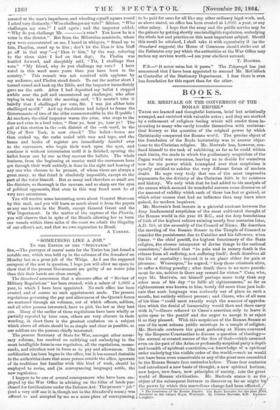"SOMETHING LIKE A JOB."
To THE EDITOR OF THE "SPECTATOR."
SIR,—The purveyor of mares' nests for the Tories has just found a notable one, which was held up in the columns of the Standard on Monday last as a gross job of the Whigs. As I am the supposed occupant of the nest in question, I hope you will allow me space to show that if the present Government are guilty of no worse jobs than this their hands are clean enough.
The Standard announces that a sinecure office of "Reviser of Military Regulations" has been created, with a salary of 1,000/. a year, to which I have been appointed. No such office has been created, and of course no such appointment made. The present regulations governing the pay and allowances of the Queen's forces are scattered through six volumes, out of which officers, soldiers, and all other persons interested, have to pick the law as they best can. Many of the earlier of these regulations have been wholly or partially repealed by later ones, others are very obscure in their wording, in short there is the greatest confusion on a subject which above all others should be as simple and clear as possible, as our soldiers are the persons chiefly interested.
The present Secretary of State for War, amongst other neces- sary reforms, has resolved on codifying and embodying in the most intelligible form in one regulation, all the regulations, memo- randa, and circulars now in force as to pay and allowances. The codification has been begun in the office, but it has seemed desirable to the authorities there that some person outside the office, ignorant of its traditions but familiar with this kind of work, should be employed to revise, and (in conveyancing language) settle, the new regulation.
I happen to be one of several conveyancers who have been em- ployed by the War Office in advising on the titles of lands pur- chased for fortifications under the Defence Act. The present" job" (and a very stiff one it is, though not in the Standard's sense,) was offered to and accepted by me as a mere piece of conveyancing, to be paid for once for all like any other ordinary legal work, and, as above stated, no office has been created at 1,000/. a year, or any other salary. I hops that the army and the public service may be the gainers by getting shortly one intelligible regulation, embodying the whole law and practice on this most important subject. Should this result be attained, I shall take it with equanimity if (as the Standard suggests) the House of Commons should strike out of the Estimates any pay which the authorities at the War Office may reckon my services worth.—I am your obedient servant, T. HUGHES.
P.S.—" It never rains but it pours." The Telegraph has just announced that I have been appointed to succeed Mr. McCulloch as Controller of the Stationery Department. I fear there is even less foundation for this report than for the other.


































 Previous page
Previous page